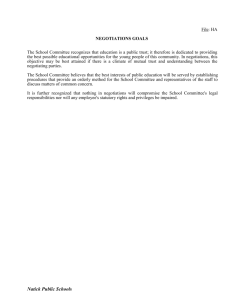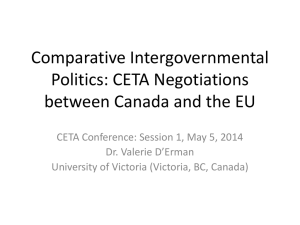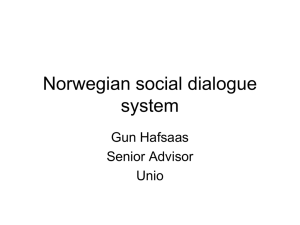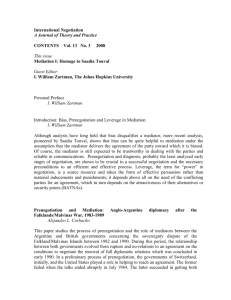International Negotiation: A Journal of Theory and Practice
advertisement
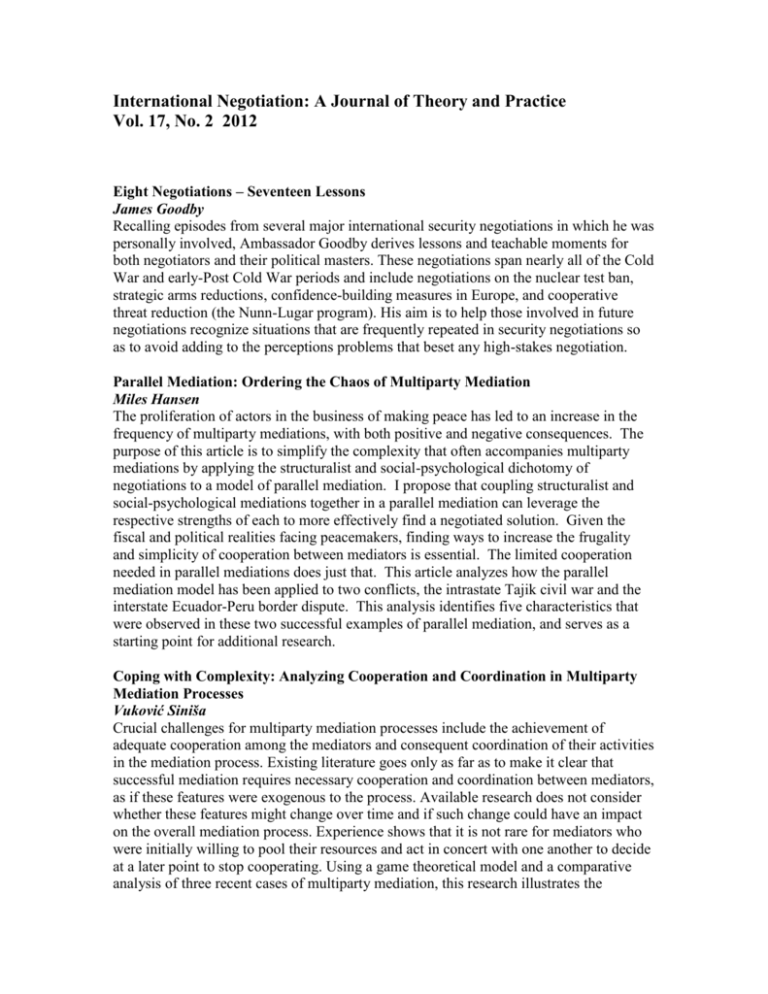
International Negotiation: A Journal of Theory and Practice Vol. 17, No. 2 2012 Eight Negotiations – Seventeen Lessons James Goodby Recalling episodes from several major international security negotiations in which he was personally involved, Ambassador Goodby derives lessons and teachable moments for both negotiators and their political masters. These negotiations span nearly all of the Cold War and early-Post Cold War periods and include negotiations on the nuclear test ban, strategic arms reductions, confidence-building measures in Europe, and cooperative threat reduction (the Nunn-Lugar program). His aim is to help those involved in future negotiations recognize situations that are frequently repeated in security negotiations so as to avoid adding to the perceptions problems that beset any high-stakes negotiation. Parallel Mediation: Ordering the Chaos of Multiparty Mediation Miles Hansen The proliferation of actors in the business of making peace has led to an increase in the frequency of multiparty mediations, with both positive and negative consequences. The purpose of this article is to simplify the complexity that often accompanies multiparty mediations by applying the structuralist and social-psychological dichotomy of negotiations to a model of parallel mediation. I propose that coupling structuralist and social-psychological mediations together in a parallel mediation can leverage the respective strengths of each to more effectively find a negotiated solution. Given the fiscal and political realities facing peacemakers, finding ways to increase the frugality and simplicity of cooperation between mediators is essential. The limited cooperation needed in parallel mediations does just that. This article analyzes how the parallel mediation model has been applied to two conflicts, the intrastate Tajik civil war and the interstate Ecuador-Peru border dispute. This analysis identifies five characteristics that were observed in these two successful examples of parallel mediation, and serves as a starting point for additional research. Coping with Complexity: Analyzing Cooperation and Coordination in Multiparty Mediation Processes Vuković Siniša Crucial challenges for multiparty mediation processes include the achievement of adequate cooperation among the mediators and consequent coordination of their activities in the mediation process. Existing literature goes only as far as to make it clear that successful mediation requires necessary cooperation and coordination between mediators, as if these features were exogenous to the process. Available research does not consider whether these features might change over time and if such change could have an impact on the overall mediation process. Experience shows that it is not rare for mediators who were initially willing to pool their resources and act in concert with one another to decide at a later point to stop cooperating. Using a game theoretical model and a comparative analysis of three recent cases of multiparty mediation, this research illustrates the importance of maintaining necessary levels of cooperation and coordination to achieve successful outcomes and provides insights on how to achieve them in case the mediating coalition is faced with internal conflict of interests. Toward an Understanding of State Behavior in Prolonged International Negotiations Christian Downie Many of the most significant international treaty negotiations take years, and sometimes decades, to conclude. The international climate negotiations, trade negotiations, and law of the sea negotiations are all examples. Yet, notwithstanding their common occurrence and importance, prolonged international negotiations are not well understood. In these negotiations, state preferences are not fixed, but fluid, as negotiating positions change. This temporal dimension of prolonged negotiations is insufficiently captured by existing theories of international negotiations, which, by virtue of their focus on individual negotiation outcomes at one point in time, tend to be static in their analysis. This article combines an analysis of existing theories of international negotiations with the findings of an empirical study of the climate change negotiations. It reveals a series of internal and external factors distinct to prolonged international negotiations, emphasizes the importance of the temporal dimension, and explains how and why the negotiating positions and the type of agreements states are prepared to sign change over time. Building on these variables, state behavior in prolonged international negotiations can be usefully conceived of as (at different points in time) either an immature or mature game, in which strategic opportunities arise at different phases of the game for networked actors to constructively influence state behavior. Eight strategies are suggested that traditionally weak actors can employ to steer prolonged international negotiations toward their preferred outcome. The Temper Tantrums of Nations: Why Would Weak Nations Challenge Hegemonic Nations? Elias L. Khalil In March 2005, riots erupted in South Korea against Japan in reaction to Japan’s claims of sovereignty over some rocky uninhabited islets (0.23 km2). What explains the moral outrage against Japan, the severity of which could have erupted into a military conflict? Such outrage is a puzzle for two reasons. First, the probability that South Korea could defeat Japan is nil, especially since the US-Japan alliance dominates the US-South Korean alliance. Second, even if the probability of defeating Japan was 100%, the net benefit of conflict was apparently negative—given the meager potential reward vis-à-vis the cost of war. This article offers a rational choice model that demonstrates that the moral outrage cannot be explained as a strategic threat. The analysis demonstrates that sociological and evolutionary game explanations are also unconvincing. This calls for an evaluation of how emotions relate to rational choice in international conflicts.






